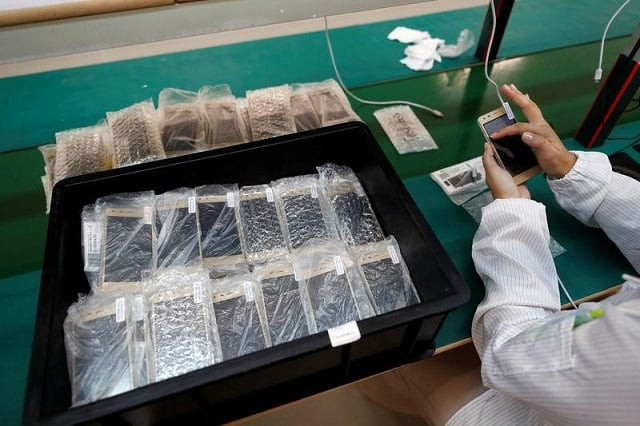Portuguese tech firm uncorks smartphone
The cork case has certified antibacterial properties and protects against battery radiation

A technician works at the Ikimobile factory in Coruche, Portugal June 21, 2018. PHOTO: REUTERS
The Ikimobile phone is one of the first to use materials other than plastic, metal and glass and represents a boost for the country’s technology sector, which has made strides in software development but less in hardware manufacturing.
A Made in Portugal version of the phone is set to launch this year as Ikimobile completes a plant to transfer most of its production from China.
“Ikimobile wants to put Portugal on the path to the future and technologies by emphasizing this Portuguese product,” chief executive Tito Cardoso told Reuters at Ikimobile’s plant in the cork-growing area of Coruche, 80 km (50 miles) west of Lisbon.
'Urban mining' pulls rare battery materials from recycled tech
“We believe the product offers something different, something that people can feel good about using,” he said. Cork is harvested only every nine years without hurting the oak trees and is fully recyclable.
Portugal is the world’s largest cork producer and the phone also marks the latest effort to diversify its use beyond wine bottle stoppers.
Portuguese cork exports have lately regained their peaks of 15 years ago as cork stoppers clawed back market share from plastic and metal. Portugal also exports other cork products such as flooring, clothing and wind turbine blades.
A layer of cork covers the phone’s back providing thermal, acoustic and anti-shock insulation. The cork comes in colors ranging from black to light brown and has certified antibacterial properties and protects against battery radiation.
Cardoso said Ikimobile is working with north Portugal’s Minho University to make the phone even 'greener' and hopes to replace a plastic body base with natural materials soon.
The material, agglomerated using only natural resins, required years of research and testing for the use in phones.
The plant should churn out 1.2 million phones a year - a drop in the ocean compared to last year’s worldwide smartphone market shipments of almost 1.5 billion.
Most cell phones are produced in Asia but local manufacture helps take advantage of the availability of cork and the 'Made in Portugal' brand appeals to consumers in Europe, Angola, Brazil and Canada, Cardoso said.
In 2017, it sold 400,000 phones assembled in China in 2017, including simple feature phones. It hopes to surpass that amount with local production this year. Top-of-the-line cork models, costing 160-360 euros ($187-$420), make up 40 per cent of sales.


















COMMENTS
Comments are moderated and generally will be posted if they are on-topic and not abusive.
For more information, please see our Comments FAQ